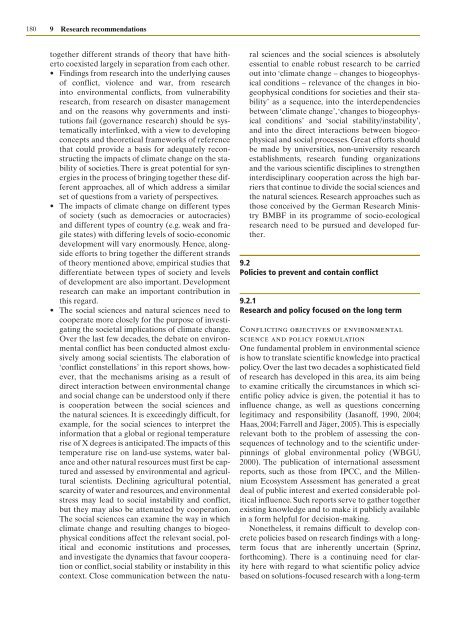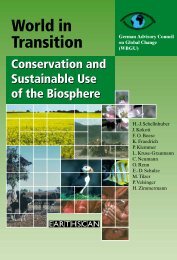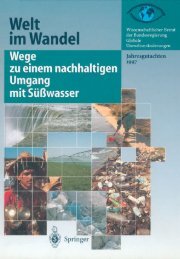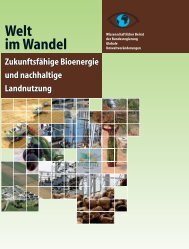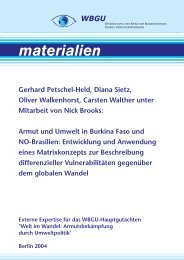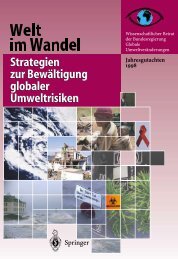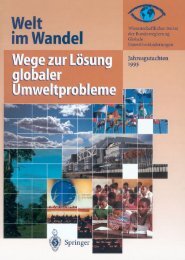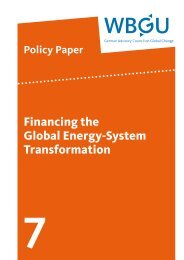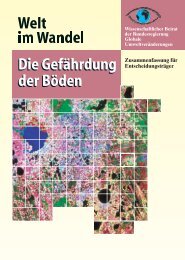World in Transition: Climate Change as a Security Risk - WBGU
World in Transition: Climate Change as a Security Risk - WBGU
World in Transition: Climate Change as a Security Risk - WBGU
You also want an ePaper? Increase the reach of your titles
YUMPU automatically turns print PDFs into web optimized ePapers that Google loves.
180<br />
9 Research recommendations<br />
together different strands of theory that have hitherto<br />
coexisted largely <strong>in</strong> separation from each other.<br />
F<strong>in</strong>d<strong>in</strong>gs from research <strong>in</strong>to the underly<strong>in</strong>g causes<br />
of conflict, violence and war, from research<br />
<strong>in</strong>to environmental conflicts, from vulnerability<br />
research, from research on dis<strong>as</strong>ter management<br />
and on the re<strong>as</strong>ons why governments and <strong>in</strong>stitutions<br />
fail (governance research) should be systematically<br />
<strong>in</strong>terl<strong>in</strong>ked, with a view to develop<strong>in</strong>g<br />
concepts and theoretical frameworks of reference<br />
that could provide a b<strong>as</strong>is for adequately reconstruct<strong>in</strong>g<br />
the impacts of climate change on the stability<br />
of societies. There is great potential for synergies<br />
<strong>in</strong> the process of br<strong>in</strong>g<strong>in</strong>g together these different<br />
approaches, all of which address a similar<br />
set of questions from a variety of perspectives.<br />
The impacts of climate change on different types<br />
of society (such <strong>as</strong> democracies or autocracies)<br />
and different types of country (e.g. weak and fragile<br />
states) with differ<strong>in</strong>g levels of socio-economic<br />
development will vary enormously. Hence, alongside<br />
efforts to br<strong>in</strong>g together the different strands<br />
of theory mentioned above, empirical studies that<br />
differentiate between types of society and levels<br />
of development are also important. Development<br />
research can make an important contribution <strong>in</strong><br />
this regard.<br />
The social sciences and natural sciences need to<br />
cooperate more closely for the purpose of <strong>in</strong>vestigat<strong>in</strong>g<br />
the societal implications of climate change.<br />
Over the l<strong>as</strong>t few decades, the debate on environmental<br />
conflict h<strong>as</strong> been conducted almost exclusively<br />
among social scientists. The elaboration of<br />
‘conflict constellations’ <strong>in</strong> this report shows, however,<br />
that the mechanisms aris<strong>in</strong>g <strong>as</strong> a result of<br />
direct <strong>in</strong>teraction between environmental change<br />
and social change can be understood only if there<br />
is cooperation between the social sciences and<br />
the natural sciences. It is exceed<strong>in</strong>gly difficult, for<br />
example, for the social sciences to <strong>in</strong>terpret the<br />
<strong>in</strong>formation that a global or regional temperature<br />
rise of X degrees is anticipated. The impacts of this<br />
temperature rise on land-use systems, water balance<br />
and other natural resources must first be captured<br />
and <strong>as</strong>sessed by environmental and agricultural<br />
scientists. Decl<strong>in</strong><strong>in</strong>g agricultural potential,<br />
scarcity of water and resources, and environmental<br />
stress may lead to social <strong>in</strong>stability and conflict,<br />
but they may also be attenuated by cooperation.<br />
The social sciences can exam<strong>in</strong>e the way <strong>in</strong> which<br />
climate change and result<strong>in</strong>g changes to biogeophysical<br />
conditions affect the relevant social, political<br />
and economic <strong>in</strong>stitutions and processes,<br />
and <strong>in</strong>vestigate the dynamics that favour cooperation<br />
or conflict, social stability or <strong>in</strong>stability <strong>in</strong> this<br />
context. Close communication between the natu-<br />
ral sciences and the social sciences is absolutely<br />
essential to enable robust research to be carried<br />
out <strong>in</strong>to ‘climate change – changes to biogeophysical<br />
conditions – relevance of the changes <strong>in</strong> biogeophysical<br />
conditions for societies and their stability’<br />
<strong>as</strong> a sequence, <strong>in</strong>to the <strong>in</strong>terdependencies<br />
between ‘climate change’, ‘changes to biogeophysical<br />
conditions’ and ‘social stability/<strong>in</strong>stability’,<br />
and <strong>in</strong>to the direct <strong>in</strong>teractions between biogeophysical<br />
and social processes. Great efforts should<br />
be made by universities, non-university research<br />
establishments, research fund<strong>in</strong>g organizations<br />
and the various scientific discipl<strong>in</strong>es to strengthen<br />
<strong>in</strong>terdiscipl<strong>in</strong>ary cooperation across the high barriers<br />
that cont<strong>in</strong>ue to divide the social sciences and<br />
the natural sciences. Research approaches such <strong>as</strong><br />
those conceived by the German Research M<strong>in</strong>istry<br />
BMBF <strong>in</strong> its programme of socio-ecological<br />
research need to be pursued and developed further.<br />
9.2<br />
Policies to prevent and conta<strong>in</strong> conflict<br />
9.2.1<br />
Research and policy focused on the long term<br />
Conflict<strong>in</strong>g objectives of environmental<br />
science and policy formulation<br />
One fundamental problem <strong>in</strong> environmental science<br />
is how to translate scientific knowledge <strong>in</strong>to practical<br />
policy. Over the l<strong>as</strong>t two decades a sophisticated field<br />
of research h<strong>as</strong> developed <strong>in</strong> this area, its aim be<strong>in</strong>g<br />
to exam<strong>in</strong>e critically the circumstances <strong>in</strong> which scientific<br />
policy advice is given, the potential it h<strong>as</strong> to<br />
<strong>in</strong>fluence change, <strong>as</strong> well <strong>as</strong> questions concern<strong>in</strong>g<br />
legitimacy and responsibility (J<strong>as</strong>anoff, 1990, 2004;<br />
Ha<strong>as</strong>, 2004; Farrell and Jäger, 2005). This is especially<br />
relevant both to the problem of <strong>as</strong>sess<strong>in</strong>g the consequences<br />
of technology and to the scientific underp<strong>in</strong>n<strong>in</strong>gs<br />
of global environmental policy (<strong>WBGU</strong>,<br />
2000). The publication of <strong>in</strong>ternational <strong>as</strong>sessment<br />
reports, such <strong>as</strong> those from IPCC, and the Millennium<br />
Ecosystem Assessment h<strong>as</strong> generated a great<br />
deal of public <strong>in</strong>terest and exerted considerable political<br />
<strong>in</strong>fluence. Such reports serve to gather together<br />
exist<strong>in</strong>g knowledge and to make it publicly available<br />
<strong>in</strong> a form helpful for decision-mak<strong>in</strong>g.<br />
Nonetheless, it rema<strong>in</strong>s difficult to develop concrete<br />
policies b<strong>as</strong>ed on research f<strong>in</strong>d<strong>in</strong>gs with a longterm<br />
focus that are <strong>in</strong>herently uncerta<strong>in</strong> (Spr<strong>in</strong>z,<br />
forthcom<strong>in</strong>g). There is a cont<strong>in</strong>u<strong>in</strong>g need for clarity<br />
here with regard to what scientific policy advice<br />
b<strong>as</strong>ed on solutions-focused research with a long-term


